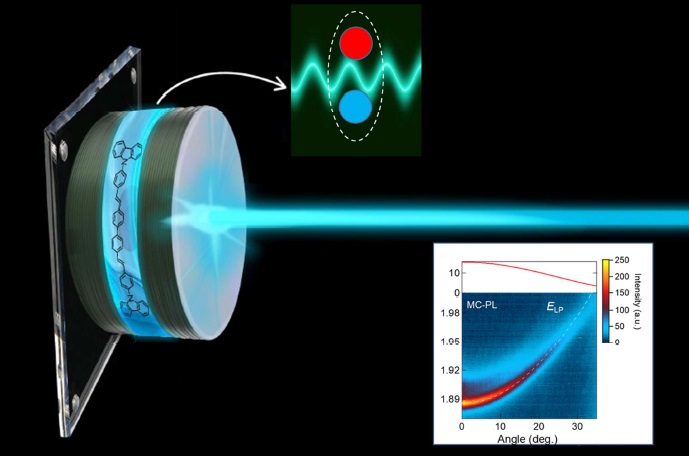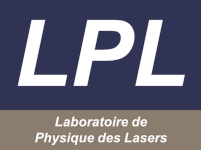| Masters Internship |
Organic exciton-polariton lasers
Keywords: Optics, Laser, organic semiconductors, Polaritons, strong coupling
NB : PhD funding is secured on this topic for 2025-2028
Scientific description:
Organic photonics is an emerging domain that led to several recent breakthroughs in the fields of photovoltaics, solid-state lighting and displays. Organic Light-Emitting Diodes (OLEDs), based on luminescence of organic semiconductors, are already present in most commercial smartphone displays owing to their remarkable 100% internal quantum efficiencies. On the other hand, organic laser diodes (relying on stimulated emission instead of spontaneous emission), have just been demonstrated, at a burgeoning stage, under direct electrical pumping, which makes it a much more exploratory topic. They represent both a fundamental challenge to overcome and a potential source of new applications for instance in bio-sensing. Unlike traditional inorganic semiconductors whose emission wavelengths are fixed to a small set of available fixed energy bandgaps, organic semiconductors are excitonic materials that can be easily tuned by chemical design to cover the whole visible spectrum. Furthermore, while traditional diode lasers are based on epitaxial techniques, organic diode lasers can be made from solution or low-temperature evaporation techniques. This enables a fabrication process at lower energy costs and with limited usage of non-renewable resources, and guarantees an easy pairing with all existing technological platforms.
In this context, Organic exciton-polariton lasers have been the focus of many very recent promising investigations. Polaritons are light-matter eigenstates that form when electronic transitions are strongly coupled to the electro-magnetic field in an optical cavity. This occurs when the light-matter interaction rate is faster than both the photon decay rate and the exciton lifetime. In this strong coupling regime, exciton-polaritons can form a condensate whose leakage from the resonator yields coherent light that is nearly indistinguishable from conventional laser emission but without relying on stimulated emission, which may unlock some of the greatest challenges remaining unsolved with organic semiconductor lasers, that is obtaining a continuous-wave regime, or reaching the “grail” of the organic laser diode.

In our group, we have developed an expertise in organic lasers in general[1], and specifically in organic vertical resonators which are the basis for the future development of exciton-polariton lasers. We have recently published a study on this topic with colleagues at Kyushu University, Japan, with all experiments being performed by us but in the Japanese lab within the framework of an international research program[2]. During this internship, we want to set up a similar experiment, as well as developing numerical tools, that will serve as a basis for all our future investigations on microcavities in the strong coupling regime.
According to her/his skills and also what she/he likes the most, the selected candidate might work predominantly on one of these three complementary projects:
- Development of numerical tools to calculate optical modes in VCSEL (Vertical Cavity Surface Emitting Laser) using Transfer-Matrix and/or RCWA (Rigorous Coupled Wave Analysis) codes and understanding organic polariton behavior in such cavities using for instance the Python QuTiP package.
- Fabrication of reliable VCSEL cavities encapsulating organic gain media. For such precise operation, fabrication development will involve the USPN clean room facility specialized in organic devices. So, the selected student would have the opportunity to develop clean room fabrication skills.
- Setting up the Fourier-plane spectral microscope, which enables obtaining maps of the emission spectrum versus angle from the device. The work will include optical design and alignment, interfacing the spectrometer software (with Python). The setting-up of a g² experiment might also be involved for instance to study organic polariton laser thresholds.
In the longer term (for a PhD), these preliminary works will be the cornerstones for topics focused on the development of diode-pumped organic exciton-polariton lasers for the study of their temporal dynamics, with the aim of heading towards continuous-wave operation that has never been observed yet.
Context of the internship
The internship, and the following possible PhD, is proposed within the framework of an international project aiming at developing organic lasers and organic semiconductor-based quantum devices. The project gathers chemists, physicists and nanofabrication specialists. In particular, an International Research Project (IRP funded by CNRS) between our team, French chemists partners and a world-leading laboratory in Japan (the Adachi group at Kyushu university), enables a full access to state-of-the-art facilities, materials, and characterization tools. Several stays in Japan are foreseen during the PhD within this project.
Applicant skills: A strong background in optics and general physics, and notions in quantum physics and lasers are needed. No specific skills in organic electronics or chemistry are required, but the candidate needs being open-minded and curious as numerous interactions with our chemist partners are foreseen. Given the pluridisciplinarity and international character of the project, the candidate (during the PhD) will play a central role between partners and consequently good communication skills are required. The work is mostly experimental but does not consist in a single “big” experiment but rather on several more simple setups. Therefore, it is expected that the candidate participates in all aspects of research, including (at the PhD level) simulation work and paper writing.
[1] S. Forget and S. Chénais : Organic Solid-state Lasers, Springer Series in Optical Science, Vol. 175, Springer. 169 pages, ISBN 978-3-642-36704-5. (2013)
[2] T. Ishii, F. Bencheikh, S. Forget, S. Chénais, B.Heinrich, D. Kreher, L. Sosa Vargas, K. Miyata, K. Onda, T. Fujihara, S. Kéna-Cohen, F. Mathevet, and C. Adachi : “Enhanced light-matter interaction and polariton relaxation by the control of molecular orientation” Advanced Optical Materials 2021, 9, 2101048. (2021) https://doi.org/10.1002/adom.202101048
Internship supervisor(s): Arnaud Jollivet, Sébastien Chénais
Internship location: Laboratoire de Physique des Lasers, Université Sorbonne Paris Nord, 93430 Villetaneuse
Possibility for a Doctoral thesis: Yes, funding is possible (Doctoral School, ANR project + co-funding) and will be actively sought. Multiple stays in Japan are probable within the PhD and will be funded through the aforementioned IRP and ANR projects.
You will find the job description here
